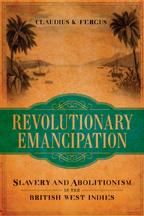
296 pages / 6.00 x 9.00 inches / no illustrations
History / United States - Southern History | Social Studies / Slavery Studies
Skillfully weaving an African worldview into the conventional historiography of British abolitionism, Claudius K. Fergus presents new insights into one of the most intriguing and momentous episodes of Atlantic history. In Revolutionary Emancipation, Fergus argues that the 1760 rebellion in Jamaica, Tacky’s War—the largest and most destructive rebellion of enslaved peoples in the Americas prior to the Haitian Revolution—provided the rationale for abolition and reform of the colonial system.
Claudius K. Fergus is a senior lecturer in the Department of History at the University of the West Indies at St. Augustine and visiting scholar at the University of Ghana, Legon.
“This elegantly argued book forces the careful reader to consider the important implications of its radical reinterpretation of western ‘progress’ and British reform.”—New West Indian Guide
"...impressively researched academic study..." —Bridget Brereton, Trinidad Express Newspapers [full review]
Found an Error? Tell us about it.